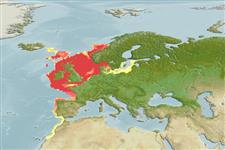| Native range | All suitable habitat | Point map | Year 2050 |

|
| This map was computer-generated and has not yet been reviewed. |
| Trisopterus minutus AquaMaps Data sources: GBIF OBIS |
Issue
The species has been long thought to be present in the Mediteranean in sympatry with Trisopterus capelanus, sometimes both as subspecies. See Delling et al. (2011: Ref. 90172) for the latest revision of the genus.